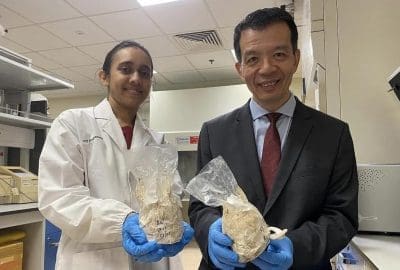Scientists in Singapore have developed a technique to cultivate a fungi-based food product that could serve as a healthier, high-quality tasting, and greener alternative to plant-based meat substitutes.

Director of NTU’s Food Science and Technology program Prof William Chen with oyster mushrooms cultivated from a base of discarded soya bean skin. Image: NTU
The protein is cultivated from fungi that grow on a base of nutrient-rich food waste, and is being scaled up with collaborators in New Zealand.
Growing from a base of food waste infuses the fungi with more essential nutrients, such as protein, iron, and amino acids.
This makes them more nutritious than ingredients commonly used in plant-based alternative meat, such as peas, chickpeas, wheat gluten, and soy, according to the team of scientists from Singapore’s Nanyang Technological University’s Food Science and Technology program.
Meat-like taste from mushrooms
The NTU-developed food product, which is based on the edible white mushroom (Agaricus bisporus), would also address several critiques of plant-based protein, which often need flavoring to be added to taste good, are highly processed, and can lack essential nutrients.
The fungi-based food product could be more readily accepted by consumers, as it already resembles meat more than other plant-based proteins, shredding similarly to cooked chicken, researchers said.
The research team noted that the product also tastes more like meat, containing higher levels of amino acids, glutamic and aspartic acids, compounds that commonly occur in animals, which give their flesh that trademark ‘meaty’ flavour.
The fungi-based food product could be more readily accepted by consumers, as it already resembles meat more than other plant-based proteins, they said.
Greener alternative
The researchers at NTU’s FST program plan to further develop the product to boost its nutritional profile and reduce food waste.
The cultivation of the food product also offers an opportunity to reuse common food waste and by-products of agriculture and the food and beverage industry, such as soybean skin, wheat stalk, and brewers’ spent grain, a byproduct of the beer-making industry.
It is estimated that globally, around 39 million tons of spent grains and 14 million tons of soybean skin, also known as okara, go to landfill annually.
“Upcycling these products to cultivate fungi, a food source familiar to Asian consumers, is an opportunity for enhancing processing efficiency in the food supply chain, as well as potentially promoting a healthier non-animal protein alternative to enrich diets,” Professor William Chen, director of NTU’s Food Science and Technology program said.
The Foodbowl, part of New Zealand Food Innovation Network, which helps food businesses and start-ups innovate and commercialise new products internationally, is teaming up with the NFU team.
Another company that is also collaborating with NTU’s FST program to implement the fungi cultivation technology in its food products is Off-piste Provisions, a plant-based meat company based in New Zealand. The solution is scheduled for commercialidation by 2024.
The protein is cultivated from fungi that grow on a base of nutrient-rich food waste.
“We are looking to team up with leading food scientists, such as NTU’s Prof William Chen, to help solve the problem that alternative protein start-ups like us face – mimicking the taste, texture and protein hit of animal products,” said Jade Gray, CEO of Off-Piste Provisions.
“We are confident that by collaborating with NTU’s Prof Chen, we can craft a range of fungi-based meat products right here in New Zealand that will entice the most hardcore carnivores, tick all the health-conscious boxes and provide the protein required.”
The fungi-based protein solution is one of the latest lines of research targeting the upcycling of food waste, by-products and other ingredients that otherwise would be discarded. The program is in line with Innova Market Insights’ “Upcycling Redefined,” which is #9 on the market researcher’s Top Ten Trends for 2022.
Source: NTU

Fungi, plant based, cell cultured…….regardless of the name……..Lab Slime is still LAB SLIME and it needs to be rejected totally by anyone and everyone concerned about their health, concerned about sustainability, concerned about cost and value and/or concerned about nature.